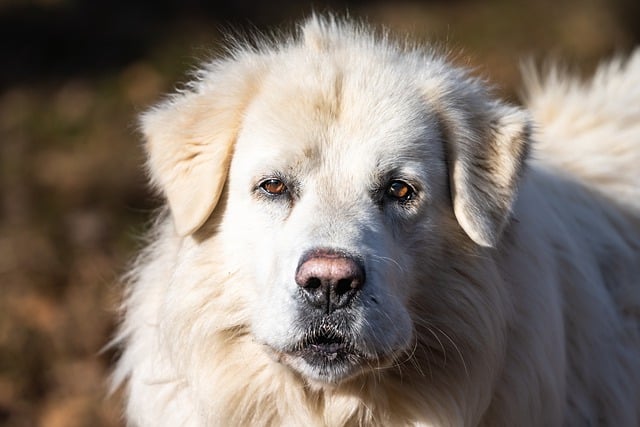While Maremma Sheepdogs and Border Collies possess their own unique set of qualities, they each bring distinct strengths to the table. The Maremma Sheepdog, with its imposing presence and exceptional guarding instincts, is a trusted protector of livestock.
Originating from the rugged mountains of Italy, this breed has been bred for centuries to fearlessly defend flocks from predators. With their large size, powerful build, and thick, weather-resistant coats, they thrive in challenging outdoor conditions.
Characteristics of Maremma Sheepdog versus Border Collie

The Border Collie and the Maremma are two distinct dog breeds with contrasting characteristics and purposes. The Border Collie is a highly intelligent and obedient breed, always brimming with mental and physical energy. They thrive when given a challenging task daily, making them ideal for active households.
With adequate exercise, they become dependable and loyal companions. Their intense focus and tendency to stare can be unsettling for other animals, and they have a natural instinct to chase. They are reserved and protective towards strangers. However, without a job or mental stimulation, Border Collies can become destructive and develop compulsive habits.
In contrast, the Maremma, also known as the Cane de Pastore Maremmano-Abruzzese, is an Italian livestock guarding dog. These dogs have a notable appearance with their thick white coats and fluffy tails.
The breed’s name is derived from the Maremma marshlands where they worked for countless years, although sheep-farming in the region has declined recently. Maremma’s are renowned for their fearlessness and dedication to protecting livestock. They excel at guarding and have a natural instinct to defend their charges, making them valuable assets to farmers and shepherds.
| Border Collie | Maremma Sheepdog | |
|---|---|---|
| Weight | Ranging from 27 to 45 pounds | Weighing between 65 and 100 pounds |
| Lifespan | Average lifespan of 12 to 18 years | Lifespan ranging from 11 to 13 years |
| Group | Herding as per AKC | Guardian as per UKC |
| Temperament | Intelligent, obedient, energetic, loves learning | Protective, hard-working, friendly, intelligent |
| Comparable Breeds | Golden Retriever | Kuvasz and Polish Tatra Sheepdog |
| Height | Ranges from 18 to 22 inches | Height typically between 23.5 and 28.5 inches |
History of Breeds
The Border Collie, renowned as the consummate sheepdog, was selectively bred in Great Britain over a century ago for its exceptional herding abilities. During the 1800s, various types of sheep herding dogs existed, with some excelling at “fetching” sheep back to the shepherd but being quite vocal and prone to nipping.
In 1873, the first sheepdog trial took place to settle disputes about the best working dogs. A remarkable dog named Hemp stood out by herding sheep calmly and silently, using a captivating gaze to intimidate them, earning the title of the father of the Border Collie.
In 1906, the breed’s first standard was established, focusing solely on working ability rather than physical appearance. It wasn’t until 1915 that the name “Border Collie” was officially adopted, reflecting the breed’s origins along the English and Scottish borders.
On the other hand, the Maremma Sheepdog is a livestock guardian breed native to the Tuscany mountains. The exact origins of this ancient breed, which has been documented since ancient Roman times, remain uncertain.
In 1898, the Maremma Sheepdog was officially registered as the Maremmano in the Libro delle Origini Italiano by the Kennel Club Italiano. The breed’s first standard was published in 1924, outlining the desired traits and characteristics.
Comparing Appearance of Maremma Sheepdog versus Border Collie
The Border Collie and the Maremma have distinct physical characteristics that contribute to their unique appearances. The Border Collie is a medium-sized dog with a slender physique and long hair. Their head is slightly broad, tapering into a muzzle, and they have half-perked ears and dark oval-shaped eyes. Their long tail may raise, but it does not curl over the back.
In contrast, the Maremma Sheepdog is a large, robust dog with a majestic and rugged appearance. Resembling a polar bear, they have a long and harsh white- or cream-colored coat that helps them blend in with the sheep they guard. The Maremma Sheepdog has a broad and flat head, triangular ears, a deep chest, and a low-set tail. Their body is heavy and slightly longer than it is tall, emphasizing their sturdy build.
Size
In terms of physical dimensions, Border Collies have an average weight that falls between 30 to 55 pounds. As for their height, they typically range from 18 to 22 inches, measured at the shoulder. These measurements give the Border Collie a medium-sized stature, allowing them to be agile and nimble in their movements.
On the other hand, the Maremma Sheepdog is a considerably larger breed. They boast a robust and sturdy build, befitting their role as livestock guardians. When fully matured, Maremma’s usually stand at a height ranging from 23.5 to 28.5 inches, measured at the shoulder.
Their weight falls within a range of 65 to 100 pounds. With their substantial size, the Maremma Sheepdog is capable of commanding authority and asserting their presence when protecting livestock and property.
Coats & Colors
The coat patterns of the Border Collie predominantly revolve around a primarily white base. Tricolor patterns showcase a combination of red, black, and white. The Border Collie exhibits various coat colors, including:
| Solid Color | Bicolor | Patterns |
|---|---|---|
| • Chocolate/liver • Seal • Tan/copper • Lilac • Slate • Australian red | • Black and white | • Blue merle • Blue merle tricolor • Chocolate/liver tricolor • Red merle • Red merle tricolor • Seal merle • Tan/copper merle • Lilac merle • Slate merle |
In contrast, the Maremma Sheepdog possesses a long, harsh, and abundantly coated exterior, with a subtle wave to the hair. The breed’s undercoat is dense, providing additional insulation.
The primary coat color of the Maremma Sheepdog is white, beautifully accompanied by markings in hues of ivory, light yellow, or pale orange on its ears. These subtle variations in color enhance the majestic and rustic charm of the Maremma Sheepdog.
Personality & Temperament Difference of Maremma Sheepdog versus Border Collie
Border Collies are known for their high energy levels and their need for a purposeful job to fulfill their herding instincts. Being highly intelligent, they require ample mental stimulation to keep their minds engaged.
Without sufficient mental stimulation, Border Collies may exhibit herding behaviors towards other pets or even children in the household. Training, socialization, and consistent mental exercises are crucial for Border Collies. While simple games can provide mental stimulation, they also thrive on more intense activities like agility, flyball, or herding competitions.
On the other hand, the Maremma is recognized for its friendly and even-tempered nature. However, being a livestock guarding breed, it does have some independent tendencies. Maremma’s are fiercely loyal to their human companions and exhibit fearlessness when it comes to protecting their loved ones.
They generally get along well with other dogs and household pets, although they may remain somewhat aloof towards strangers. Early socialization is recommended to manage their protective instincts and prevent dominance or willfulness. Due to their intelligence, Maremma’s also require ample mental stimulation to prevent boredom-induced problem behaviors from developing.
Dogs towards Family
Both Border Collies and Maremma Sheepdogs can make wonderful family pets, but they have some differences in terms of temperament and behavior. Border Collies, whether male or female, are known to be excellent family dogs.
While females may tend to be calmer than males, both genders can be loving and friendly towards family members. Border Collies are not naturally aggressive, and they can get along well with children when proper teaching on how to interact with dogs is provided. Their friendly nature allows them to enjoy the company of their human family members and be loyal companions.
Similarly, the Maremma Sheepdog can also be a great addition to a family. When raised within a family environment, Maremma’s display utmost devotion and affection towards their loved ones. They have a natural instinct to protect their family members, including children, from potential harm. This breed has a gentle and protective demeanor, making them suitable companions for families.
Kids
Before bringing a Border Collie into your family, there are important considerations to keep in mind, especially when dealing with young or poorly socialized dogs. It is not uncommon for young Border Collies to exhibit herding behavior towards children in their family. While this may initially seem amusing, it is crucial not to encourage this behavior.
Establishing boundaries is crucial for both your children and the puppy to learn proper behavior from the beginning. It is essential to communicate to your children that when the puppy starts herding, they should either leave the area or redirect the puppy’s attention to an appropriate activity.
Meanwhile, the Maremma Sheepdog generally gets along well with children and is loving and affectionate towards them. However, they may not tolerate rough or harsh behavior from children.
It is crucial to teach your children how to behave around dogs and to raise them alongside the Maremma from an early age. Older children who understand how to interact with dogs and handle them appropriately tend to have the best relationship with Maremma Sheepdogs.
Other People
Border Collies are known for their loyalty and affection towards their owners. They form strong bonds and thrive on the companionship and attention they receive from their human family. However, when it comes to strangers, whether they are people or other dogs, Border Collies can be wary. Their cautious nature stems from their instinct to protect their family and territory.
This wariness can manifest in their behavior as they may exhibit reserved or guarded tendencies when encountering unfamiliar individuals or animals. While their wariness towards strangers is a natural trait, proper socialization and training can help them navigate these situations with ease and confidence.
When it comes to strangers, Maremma’s can exhibit reserved behavior. Their protective instincts make them excellent watchdogs, and they may be alert and cautious in the presence of unfamiliar individuals.
However, Maremma’s typically rely on their bark as a deterrent rather than displaying aggression. They have a natural ability to assess situations and act accordingly, using their keen instincts to protect their loved ones and their territory.
Dogs & Other Animals
Border Collies generally do well with other dogs due to their history of working alongside other shepherds to handle larger flocks. Being sociable is a desirable trait in the breed, as it allows them to effectively cover more ground and work collaboratively.
While Border Collies may not engage in typical dog play, they enjoy chasing and running alongside other dogs. When it comes to other pets, such as cats, Border Collies can coexist peacefully if introduced early in their lives. Proper socialization and training are crucial to teach them how to interact appropriately with other animals.
Similarly, Maremma Sheepdogs have a tendency to get along well with other pets due to their upbringing as livestock guardians. They were raised to coexist with various animals, including other dogs and cats. It is not uncommon to find a Maremma Sheepdog cuddled up or forming bonds with other pets in the household.
Behavior Issues
Border Collies, if not given proper training or consistent mental stimulation, can develop behavioral issues. One common behavior is their instinct to herd and nip at the heels of children or adults. This behavior stems from their strong herding instincts and can be problematic if not properly channeled.
Additionally, Border Collies may exhibit destructive habits such as chewing or digging when they are bored or frustrated. They may also bark excessively when bored or frustrated, so it is crucial to have engaging activities ready for them to keep them mentally and physically satisfied.
Similarly, Maremma Sheepdogs are active dogs that require regular and vigorous exercise. They have a natural inclination to work and perform tasks. If they are not given sufficient outlets for their energy or if they are left without any job or activity, they can become bored and exhibit destructive behavior.
This may manifest as chewing on objects or continuous barking. Providing them with opportunities to engage in meaningful activities or work can help prevent these negative behaviors.
Training & Exercise Comparison
Training a Border Collie can be a delightful and fulfilling experience, thanks to their inherent working dog instincts, remarkable intelligence, and high energy level. They demonstrate exceptional aptitude in learning basic commands and thrive in advanced training sessions. Their innate abilities make them an excellent fit for dynamic activities such as frisbee and fetch.
It is crucial to start training Border Collies as early as possible to provide them with the necessary mental stimulation. Without proper outlets for their energy, they can become prone to destructive behavior. Redirecting their natural instincts is important to prevent them from herding young children or other pets. Training sessions should focus on obedience and reinforcing appropriate behavior.
On the other hand, training a Maremma Sheepdog can be more challenging, and they may not be recommended for first-time dog owners. As a sheepdog, they are accustomed to spending long hours in the field with their sheep, which can make it difficult for them to pick up commands and pay attention to human instructions.
While Maremma’s can learn basic obedience skills, they may not have the same desire to please their owners as other dogs. Training requires patience and trust from both the owner and the dog, and it may take time for the pup to understand and respond to commands.
Taking Care & Maintenance of Maremma Sheepdog versus Border Collie
Border Collies have a strong aversion to being left alone, and simply providing them with space to roam is not enough. They require companionship and a specific task or job to keep them engaged. When left bored and unstimulated, they may engage in destructive behaviors such as chasing cars, digging, chewing furniture, or excessive barking. It is crucial to provide plenty of activities to keep a Border Collie mentally and physically stimulated.
Additionally, due to their herding instincts, they may exhibit herding behaviors by nudging and nipping at humans and other pets, which can potentially lead to conflicts in a multi-pet household.
Maremma Sheepdogs also require daily exercise to maintain their overall health and mental well-being. Regular physical activity helps combat boredom, which is often a precursor to destructive behavior.
Engaging in activities that fulfill their natural instincts to chase, retrieve, chew, dig, and herd is important for their satisfaction. The specific exercise needs of a Maremma Sheepdog will depend on their age and health condition. A short walk around the block and a few minutes in the backyard may not be sufficient, especially for adolescent dogs aged 6 to 18 months, as they typically have higher exercise requirements.
Grooming a Maremma Sheepdog versus a Border Collie
Border Collies generally require regular brushing a few times a week to maintain the condition of their coat and remove any dead hair. In addition to brushing, they may also benefit from professional grooming to keep their coat looking its best.
It’s important to introduce grooming and handling to a Border Collie in a positive and gradual manner, allowing them to become comfortable and relaxed during the process. By building trust and confidence, grooming sessions can become an enjoyable experience for both the dog and the owner.
For Maremma Sheepdogs, regular brushing is also recommended to help keep their coat clean and reduce shedding. Checking for ticks and fleas on a daily basis, especially during warmer months, is important for their overall well-being.
Bathing needs for Maremma Sheepdogs are generally minimal and may only be necessary a few times per year. Before bathing, it is important to carefully remove any mats from their hair through cutting or combing. When bathing, make sure to rinse all soap residue thoroughly to prevent dirt from sticking to the coat.
Shedding
The Border Collie possesses a double coat that includes a long, sleek, and feathered outer layer along with a shorter, rougher undercoat. When it comes to shedding, Border Collies typically fall into the moderate shedding category. Throughout most of the year, they shed a moderate amount of hair. Regular brushing sessions, conducted two to three times per week, generally prove effective in managing shedding and removing dead hair from their coat.
However, twice a year, during the spring and fall, Border Collies go through a more intense shedding period. During this time, shedding increases significantly.
As for the Maremma Sheepdog, they also have a dense undercoat that sheds twice a year, typically in the spring and fall. During these seasons, more frequent brushing and bathing may be necessary to manage the shedding and keep their coat in good condition.
Health Background of Maremma Sheepdog versus Border Collie
Both Border Collies and Maremma Sheepdogs are generally healthy breeds, but they can be prone to certain genetic diseases. Responsible breeders take steps to minimize the risk of these diseases by conducting health screenings on prospective parents.
While both breeds have good health records, there are specific health conditions known to occur in each breed. Common health issues in both Border Collies and Maremma Sheepdogs include:
- Hip dysplasia
- Certain eye conditions, such as progressive retinal atrophy (PRA) and hereditary eye diseases
- Epilepsy
- Bloat (gastric dilatation-volvulus)
Life Span
Border Collies are generally a healthy breed with a relatively long average lifespan of 12 to 15 years. As for the Maremma Sheepdog, their life expectancy typically ranges from 11 to 13 years, which is slightly shorter compared to some other pure breeds.
However, as for both dogs, this should not cause excessive concern as lifespan can be influenced by various genetic and environmental factors. With proper health care, including regular veterinary visits, a balanced diet, exercise, and attention to their specific needs, the lifespan of a Maremma Sheepdog can be extended.
Diet & Nutrition
Border Collies, being active and energetic dogs, require a high-quality diet that meets their nutritional needs. A balanced diet with increased protein content is important to support their high activity levels and maintain muscle health. Look for dog foods that contain high-quality sources of protein, such as chicken, beef, or fish. It is also beneficial to choose a food that is rich in omega-3 fatty acids, as this can help promote a healthy coat and support joint health in Border Collies.
When it comes to feeding Border Collies, it is essential to consider their life stage. Like for example, during the puppy stage, it is recommended to feed them a high-quality puppy food that is specially formulated to meet the nutritional requirements of growing dogs.
As for the Maremma Sheepdog, being a larger breed, they will require a proportionally larger amount of food compared to smaller breeds. On average, a Maremma Sheepdog may consume around two to three cups of high-quality dog food per day.
It is important to choose a dog food brand that provides complete and balanced nutrition for their size and age. Ensure that the food you select is formulated to meet the specific nutritional needs of large breeds.
Health Issues
Both Border Collies and Maremma Sheepdogs have certain health concerns that potential owners should be aware of. For Border Collies, hip dysplasia, progressive retinal atrophy (PRA), Collie Eye Anomaly (CEA), and deafness are common issues. Maremma Sheepdogs, on the other hand, are prone to canine hip and elbow dysplasia, entropion and ectropion (eye conditions), distichiasis (abnormal eyelash growth), gastric torsion (bloat), and patellar luxation (kneecap dislocation).
Cost of Border Collie versus Maremma Sheepdog
When it comes to the initial costs of owning a dog, there are some differences between the Border Collie and the Maremma Sheepdog. For a Border Collie, you can expect to spend around $2,500 in the first year alone. This includes expenses such as food, treats, medical care, training classes, grooming, and various accessories like bowls, crates, beds, and toys. While it may be challenging to find a purebred Border Collie in a pet store, you can consider adopting from a reputable breeder or a rescue or shelter.
On the other hand, the Maremma Sheepdog is a rarer breed, which may affect its initial costs. The annual expenses for a Maremma Sheepdog, including medical and dietary needs, typically range from $1,500 to $2,000. Although the Maremma Sheepdog is a pure breed, it is not as commonly found as some other dog breeds.
Puppies

When it comes to the cost of acquiring a puppy, there are differences between the Border Collie and the Maremma Sheepdog. The price range for a Border Collie puppy is typically between $300 and $1,000, with the average cost being around $700. It’s important to note that different colors and patterns may affect the price, with blue merle Border Collies being more expensive, costing up to $4,500, and red merles costing up to $1,200.
On the other hand, Maremma Sheepdogs are generally more affordable to acquire. The cost of a Maremma Sheepdog puppy can range from $600 to $800. While this is not as expensive as some other dog breeds, it’s worth noting that Maremma Sheepdogs are relatively rare to find.
Breeders & Centers
Choosing to adopt a dog, whether it’s a Border Collie or a Maremma Sheepdog, can be a wonderful and fulfilling experience. In the case of Border Collies, the price of adopting from reputable breeders typically ranges between $600 and $800.
When adopting from a dog shelter, you may also benefit from health testing that has been conducted on the dogs. This information can give you valuable insights into any pre-existing conditions or health concerns the dog may have.
Similarly, adopting a Maremma Sheepdog can be a more affordable option compared to purchasing one from a breeder. The adoption cost for a Maremma Sheepdog is usually around $300, which covers the expenses associated with their care prior to adoption. On the other hand, buying a Maremma Sheepdog from a breeder can be quite expensive, with prices ranging from $600 to $1,300, depending on their lineage.
Conclusion: Which Is Better For Me, Border Collie or Maremma Sheepdog?
When deciding between a Border Collie or a Maremma Sheepdog as your canine companion, it’s essential to consider your specific lifestyle, preferences, and needs. Both breeds offer unique qualities and excel in different areas.
If you’re an active individual seeking a highly trainable and intelligent dog with boundless energy, the Border Collie might be the ideal choice. They thrive on mental stimulation, excel in obedience training, and are well-suited for activities like agility, flyball, or advanced obedience competitions. However, keep in mind that their high energy levels require ample exercise and mental stimulation to prevent boredom or destructive behaviors.
On the other hand, if you have livestock or a large property that requires protection, the Maremma Sheepdog could be a perfect fit. With their imposing presence, natural guarding instincts, and loyalty, they excel as livestock guardians. They are typically calm, patient, and dedicated to their job, making them a reliable and trustworthy companion for rural settings.
Ultimately, the “better” choice between the two breeds depends on your specific lifestyle, preferences, and the purpose you have in mind. Both the Border Collie and the Maremma Sheepdog are intelligent, trainable, and make wonderful companions when provided with the appropriate care, exercise, and mental stimulation they require.
Remember, choosing a dog breed is a personal decision, and it’s important to research and interact with both breeds to determine which one aligns best with your lifestyle and expectations. Consulting with reputable breeders, trainers, and experienced dog owners can provide valuable insights and help you make an informed choice.


